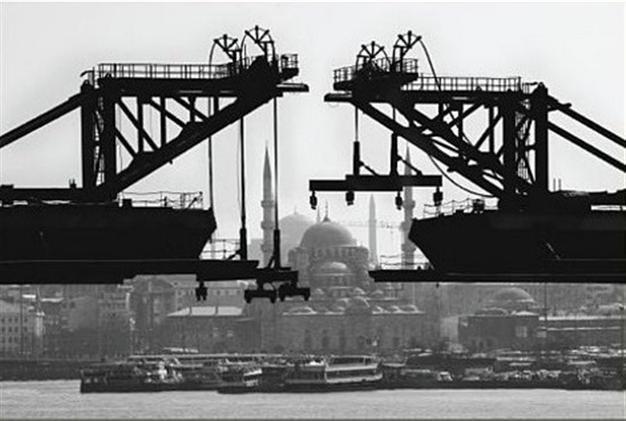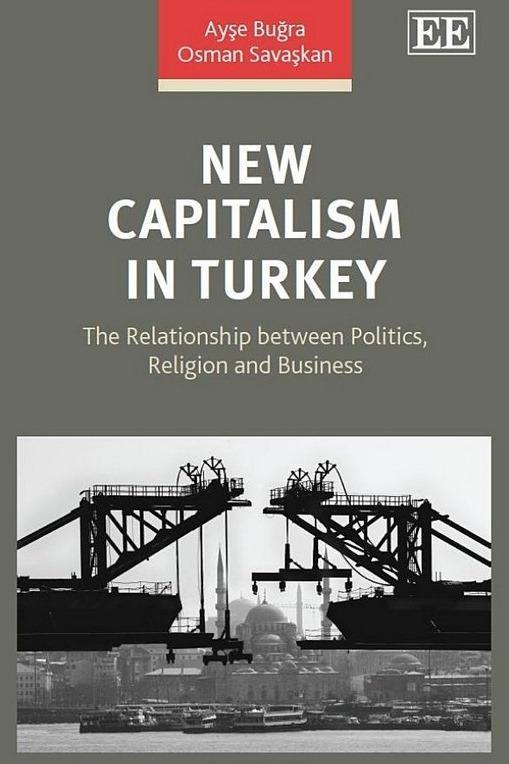New capitalism in Turkey: Politics, religion and business
William ARMSTRONG - william.armstrong@hdn.com.tr

Photo by Merve Çevik.
‘New Capitalism in Turkey: The Relationship between Politics, Religion and Business’ by Ayşe Buğra and Osman Savaşkan (Edward Elgar, $99, 224 pages)Favoritism in the process of capital accumulation has been central throughout Turkey’s modern economic history. In the early republic, the country had no independent industrial class, so the Kemalist nation-builders encouraged the top down creation of a “national bourgeoisie,” nursing the development of big business groups that were dependent on the state for industrial and infrastructural projects. Today, for all the changes that the country has undergone, politically-supported capital accumulation still plays a central role in the Turkish economy, with governments happy to use carrots and sticks against companies. While professing bold new steps toward an “advanced democracy,” the ruling Justice and Development Party (AKP) has been happy to use old-fashioned patronage to foster a pliant business community and cement its own position in the reins of the state. This clear-eyed and clearly written new title by Ayşe Buğra and Osman Savaşkan, two economists at Istanbul’s Bosphorus University, is a must read to understand the last 30 years of Turkey’s economic development.

The AKP first came to power after a series of punishing economic crises in 1994, 1999 and 2001, all more or less precipitated by the lack of adequate regulatory mechanisms, particularly in the financial sector. After the sweeping liberalization of its economy in the 1980s, Turkey was taught the hard way that a sound regulatory framework is necessary to assure the stable functioning of a market economy. In response to the last of these crises, the IMF recommended a series of painful and unpopular “good governance” reforms, which the AKP continued to pursue after coming to power in 2002. Buğra and Savaşkan write that the IMF reforms were designed to “separate the economy and politics … to create an institutional structure for the proper management of the economy by an autonomous bureaucracy,” thus avoiding the discretionary intervention of politicians that had proved so damaging in the past.
It was generally accepted that the reforms would limit the government’s ability to influence private-sector activity, and that the particularism that had previously characterized government-big business relations would no longer be possible. Nevertheless, the AKP has steadily rolled back many of the changes. Key examples explored by the authors are the cases of the Public Procurement Authority (KİK) and the Public Procurement Law. Introduced in 2002, both aimed to promote the transparency of public tender procedures, limiting the discretionary involvement of the ruling authorities and opening up public tenders to international competition. However, from 2003 to 2013, successive AKP governments have changed the law 29 times, making over 100 amendments to its scope and applications. These changes amount to a gradual, step-by-step castration of the KİK’s independence and regulatory powers, allowing for arbitrary executive intervention in support of politically privileged entrepreneurs. In the final coup de grâce, a 2011 governmental decree brought all independent regulatory agencies under the authority of the related ministries, while the KİK was restructured to ensure that membership of its steering committee was limited to bureaucrats appointed by the government. This is all very important because lucrative public tenders overseen by the KİK have become notorious as a means through which the AKP has rewarded supportive business groups and punished others. In its quest to secure itself a pliant business network, the AKP seems determined to unlearn the hard lessons of previous economic crises.
The variously-acronymed national business associations that have emerged in recent decades are another avenue through which the AKP has been able to pursue clientistic relations with the private sector. Since its founding in 1990, the Independent Industrialists’ and Businessmen’s Association (MÜSİAD) of “Anatolian” companies has defined itself in opposition to the more established and secular big business group the Turkish Industrialists’ and Businessmen’s Association (TÜSİAD). In MÜSİAD (the first letter of which is often tellingly misrepresented as “Muslim”), religion is often used as capital to establish links of trust between member companies of different sizes located in different sectors and regions. Of all major business associations, the AKP government identifies most closely with MÜSİAD, which provides it with a unique tool to reward friendly businesses. As the authors write:
The associations that used religion as a network resource have emphasized the discrimination that conservative Muslims faced in a business environment historically dominated by the secularist business establishment to strengthen the bonds among their members and to keep them within the constituency of political Islam ... [They] include some economic actors while excluding others. In fact, the exclusion of the "other" becomes integral to the building of solidarity among "us."
As Buğra and Savaşkan write, the business association environment exemplifies Turkey’s polarization between entrenched camps and “exacerbates its economic and political cleavages.”
There’s much to praise in this rich and impressive book. It convincingly shows how earlier hopes that the country would leave behind the intense patronage networks of the past and develop into a successful, “normalized” economy have been disappointed. With favoritism and particularism defining the ruling AKP’s relations with the private sector, the business environment today finds itself as yet another arena for Turkey’s bitter political and cultural turf wars.

 The AKP first came to power after a series of punishing economic crises in 1994, 1999 and 2001, all more or less precipitated by the lack of adequate regulatory mechanisms, particularly in the financial sector. After the sweeping liberalization of its economy in the 1980s, Turkey was taught the hard way that a sound regulatory framework is necessary to assure the stable functioning of a market economy. In response to the last of these crises, the IMF recommended a series of painful and unpopular “good governance” reforms, which the AKP continued to pursue after coming to power in 2002. Buğra and Savaşkan write that the IMF reforms were designed to “separate the economy and politics … to create an institutional structure for the proper management of the economy by an autonomous bureaucracy,” thus avoiding the discretionary intervention of politicians that had proved so damaging in the past.
The AKP first came to power after a series of punishing economic crises in 1994, 1999 and 2001, all more or less precipitated by the lack of adequate regulatory mechanisms, particularly in the financial sector. After the sweeping liberalization of its economy in the 1980s, Turkey was taught the hard way that a sound regulatory framework is necessary to assure the stable functioning of a market economy. In response to the last of these crises, the IMF recommended a series of painful and unpopular “good governance” reforms, which the AKP continued to pursue after coming to power in 2002. Buğra and Savaşkan write that the IMF reforms were designed to “separate the economy and politics … to create an institutional structure for the proper management of the economy by an autonomous bureaucracy,” thus avoiding the discretionary intervention of politicians that had proved so damaging in the past.